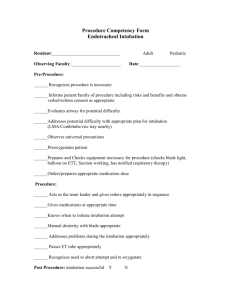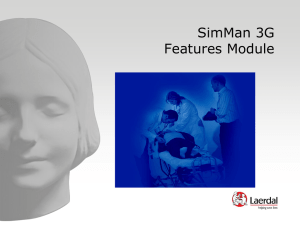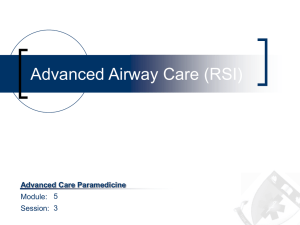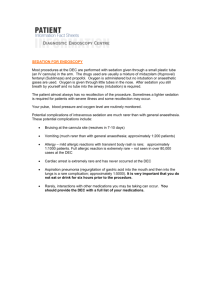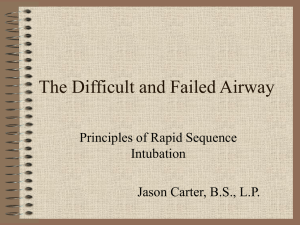8-3 Medication Facilitated Intubation
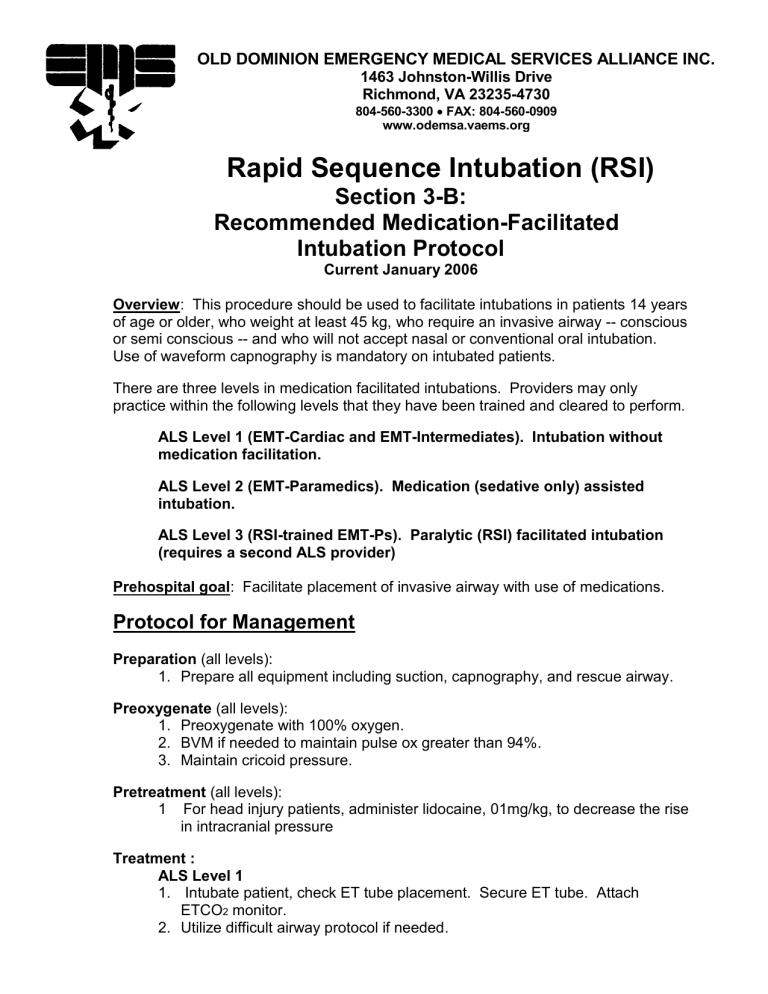
OLD DOMINION EMERGENCY MEDICAL SERVICES ALLIANCE INC.
1463 Johnston-Willis Drive
Richmond, VA 23235-4730
804-560-3300
FAX: 804-560-0909 www.odemsa.vaems.org
Rapid Sequence Intubation (RSI)
Section 3-B:
Recommended Medication-Facilitated
Intubation Protocol
Current January 2006
Overview : This procedure should be used to facilitate intubations in patients 14 years of age or older, who weight at least 45 kg, who require an invasive airway -- conscious or semi conscious -- and who will not accept nasal or conventional oral intubation.
Use of waveform capnography is mandatory on intubated patients.
There are three levels in medication facilitated intubations. Providers may only practice within the following levels that they have been trained and cleared to perform.
ALS Level 1 (EMT-Cardiac and EMT-Intermediates). Intubation without medication facilitation.
ALS Level 2 (EMT-Paramedics). Medication (sedative only) assisted intubation.
ALS Level 3 (RSI-trained EMT-Ps). Paralytic (RSI) facilitated intubation
(requires a second ALS provider)
Prehospital goal : Facilitate placement of invasive airway with use of medications.
Protocol for Management
Preparation (all levels):
1. Prepare all equipment including suction, capnography, and rescue airway.
Preoxygenate (all levels):
1. Preoxygenate with 100% oxygen.
2. BVM if needed to maintain pulse ox greater than 94%.
3. Maintain cricoid pressure.
Pretreatment (all levels):
1 For head injury patients, administer lidocaine, 01mg/kg, to decrease the rise in intracranial pressure
Treatment :
ALS Level 1
1. Intubate patient, check ET tube placement. Secure ET tube. Attach
ETCO
2
monitor.
2. Utilize difficult airway protocol if needed.
ALS Level 2 (medication facilitated)
1. Administer Etomidate, 0.3mg/kg IV for sedation. Versed 0.05mg/kg IV is an acceptable alternative sedative (max dose 05mg).
2. Intubate patient, check ET tube placement. Secure ET tube. Attach
ETCO
2
monitor.
3. Utilize difficult airway protocol if needed.
ALS Level 3 (Rapid Sequence Intubation)
1. Administer Etomidate, 0.3mg/kg IV for sedation. Versed 0.05mg/kg IV is an acceptable alternative sedative (max dose 5mg)
2. Administer Succinylcholine 1.5 to 2.5mg/kg IV for paralysis.
3. Vecuronium 0.1mg/kg IV can be used by itself for paralysis, in patients with contraindications to Succinylcholine, or in conjunction with Succinylcholine for long-term paralysis.
4. Intubate patient, check ET tube placement. Secure ET tube. Attach
ETCO
2 monitor
.
5. Utilize difficult airway protocol if needed.
Post Treatment Levels 2 and 3
1. Monitor and document airway and vitals post procedure, including continuous waveform ETCO
2
and pulse ox.
2. Versed can be given for post intubation sedation 0.05mg/kg IV
3. Vecuronium, 0.1mg/kg IV, can be given for continued paralysis if clinically indicated. REMEMBER TO GIVE PROPER SEDATION.
4. Document procedure and waveform ETCO
2
.
5. Make appropriate notifications if Level 3 (RSI) is used.
Medications
Pretreatment
ALS level 1
Lidocaine 1 mg/kg IV
ALS level 2 ALS level 3
Lidocaine 1 mg/kg IV Lidocaine 1 mg/kg IV
Sedation
Sedation
Paralytic
Paralytic none none none none
Etomidate 0.3 mg/kg
IV
Versed 0.05 mg/kg IV
Etomidate 0.3 mg/kg
IV
Versed 0.5 mg/kg
IV none none
Succinylcholine 1.5 to
2.5 mg/kg IV
Vecuronium 0.1 mg/kg IV
Versed 0.05 mg/kg IV Versed 0.05 mg/kg IV Post intubation sedation
Post intubation paralysis
Versed 0.05 mg/kg IV none none Vecuronium 0.1 mg/kg IV
Adapted by the Old Dominion EMS Alliance
Source: Chesterfield County Fire and EMS
January 2006
